#Makkah First
Explore tagged Tumblr posts
Text
Quba Mosque
The world’s first mosque The world’s first mosque carries profound historical significance in the history of Islam. The mosque is located in the city of Madinah in Saudi Arabia and is known as the Quba Mosque. Its construction dates back to the early days of Islamic propagation, especially during the 7th century at the time of Prophet Muhammad (peace be upon him). The Quba Mosque stands as a…
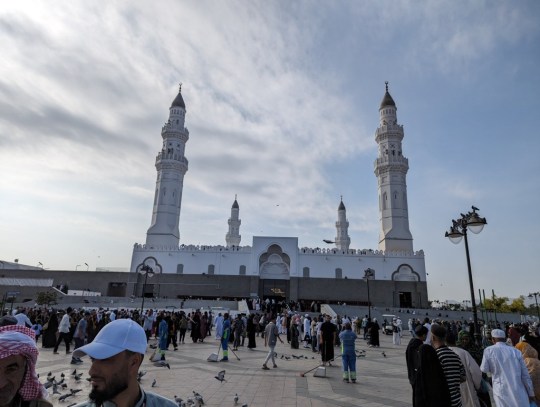
View On WordPress
#Hijra#History of Islam#Makkah#Masjid Al-Quba#Migration#Migration of Prophet Mahammad#Quba mosque#Sunnah#The world&039;s first Mosque
0 notes
Text
dhul hijjah - a second chance after ramadan ♡
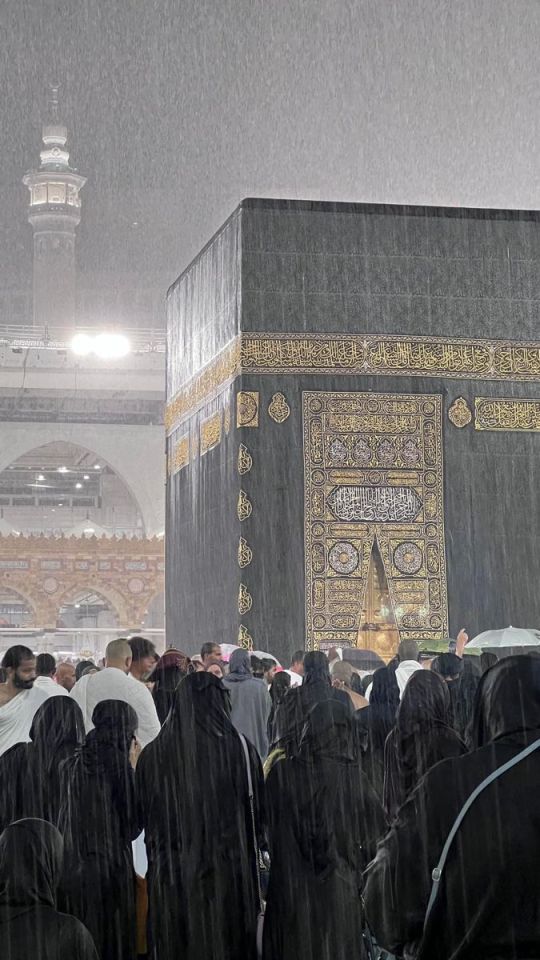
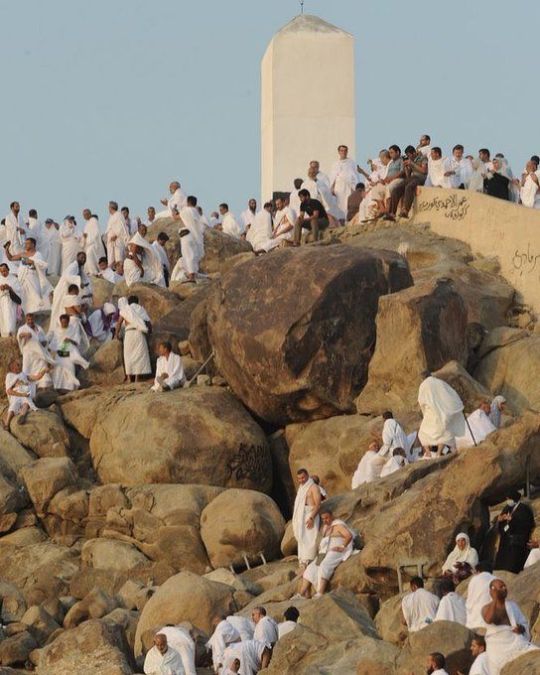
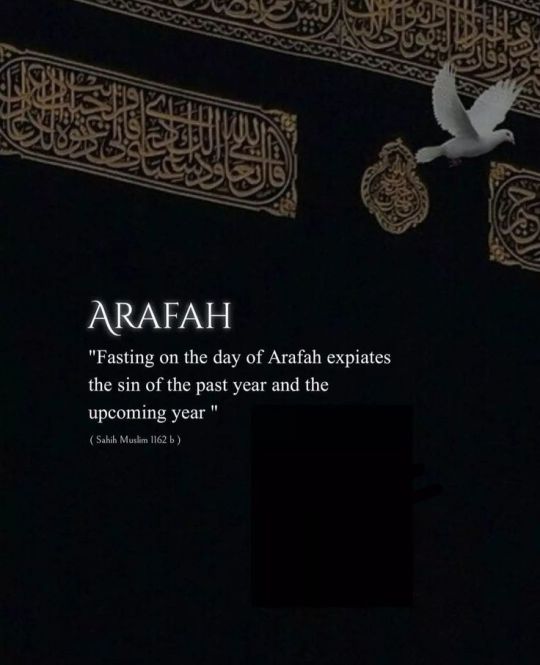
what is dhul hijjah?
meaning 'the month of the pilgrimage' as many muslims go on hajj in this time, dhul hijjah is the twelfth and final month of the islamic year. the first ten days of this month are the best days of the entire year. yes - even better than ramadan:
it was narrated by Ibn Abbas that the Prophet ﷺ said: “There are no days during which righteous deeds are more beloved to Allah than these days,�� meaning the (first) ten days of Dhul- Hijjah" - Sunan Ibn Majah 1727
these ten days encompass the day of Arafah, Hajj, and Eid ul-Adha
this month, we remember prophet Ibrahim (as) and how he was told by Allah to sacrifice his son, Hadrat Ismail (as). he took hadrat Ismail (as) on top of mount Arafat for the sacrifice, and just as he was about to sacrifice Ismail (as), Allah told him to stop as He was only testing him to see if he was truly obedient and willing to sacrifice everything for Allah's sake. the 9th day of dhul hijjah is the day of Arafah, commemorating this event.
we also remember how Allah told Ibrahim (as) to leave Ismail (as) and his wife, Hadrat Hajar, in a desert - which, today, is present day makkah.
this month is therefore about obedience, surrender and sacrifice for Allah سُبْحَٰنَهُۥ وَتَعَٰلَىٰ.
depending on the sighting of the moon, dhul hijjah is expected to begin friday 7th june!
what to do in these first ten days?
even if you're not going for hajj, you should use these blessed days for extra righteous deeds and worship, especially on the day of arafah - the 9th day (which falls on 16th june this year, Insha'Allah) - the day before eid.
FASTING
it is a sunnah to fast the first 9 days of dhul hijjah. if you won't fast all 9 days, then it's best to prioritise the 9th day, the day of Arafah. this is because the prophet ﷺ said: “Fasting on the Day of ‘Arafah expiates for the sins of the year before and the year after.” (Sunan Ibn Majah 1730) however, unless you're going for hajj and you're actually at Afarah, then you cannot as it's forbidden to fast while on the mountain.
DHIKR
it's extremely important to increase your dhikr in this time. recite the tasbeeh, tahmeed, takbeer and tahleel often: tasbeeh - subhanallah (Holy is Allah) tahmeed - alhamdulillah (all praise belongs to Allah) takbeer - Allah Akbar (Allah is the Greatest) tahleel - laa ilaha ill-Allah (there is no God except Allah) Allah said “remembrance of Allah indeed is the greatest virtue” (29:46) - it brings you closer to Him, you feel more certain in His powers that He can remove any hardship which makes the heart feel less anxious, Allah becomes your Friend, you'll become successful (remember Allah often so you may prosper” (8:46), it cleans your heart, it protects you from harm, Allah becomes pleased with you. it truly is the greatest virtue.
also recite istighfar (astagfirullah) and repent for your sins
the best dua to recite on the day of Arafah itself is:
laa ilaaha ill-allaahu, waḥdahu laa shareeka lah, lahul-mulku wa lahul-ḥamdu, wa huwa ‛alaa kulli shay’in qadeer - (None has the right to be worshipped except Allah, alone, without partner. To Him belongs sovereignty and all praise and He is over all things omnipotent)
OTHER INCREASED ACTS OF WORSHIP
do extra voluntary acts of worship (nawafil, sunnah prayers, duha prayers)
read a lot of Qur'an
listen to the Qur'an more
send many, many salutations to the Prophet ﷺ (durood sharif!)
practice gratitude. what are you thankful for?
pray tahajjud
give sadaqah / donate to a charity. make sacrifices!
be kind!
read translation and commentary of surahs
listen to islamic podcasts/read islamic books to increase your knowledge
memorise a surah
talk to Allah!!!! pray!!!!
try and increase your acts of worship throughout the 9 days and especially on the 9th day, the day of arafah, which is the day before eid! (16th june Insha'Allah, depending on where you are in the world)
10th day - eid ul adha
on the tenth day of dhul hijjah (eid), our beloved Prophet ﷺ used to give Qurbani (a sacrifice) every year to remember Ibrahim (as) almost sacrificing his son for Allah سُبْحَٰنَهُۥ وَتَعَٰلَىٰ's sake. muslims sacrifice animals all over the world to follow this sunnah, and donating qurbani is encouraged for every Muslim who is financially able to do so (this can be done online)

may Allah سُبْحَٰنَهُۥ وَتَعَٰلَىٰ make it easy for us to utilise these blessed and best 10 days to the best of our abilities, forgive us of our sins, draw us ever nearer to Him and allow us to become His best friends, Allahumma Ameen ♡
#islam#dhul hijjah#arafah#muslim#religion#sabrgirl#ramadan#allah#quran#prayers#islamic#muslims#arafat#jummah
192 notes
·
View notes
Text
Y'all once I accidentally took my Jay minifigure to Makkah so like is he Muslim now???
Edit: disabled reblogs because now I'm starting to feel like I shouldn't have posted this in the first place but at the same time so many people have already seen this post...
145 notes
·
View notes
Text
While I was looking into Fulla dolls, I found out another Muslim fashion doll was released around the same time!
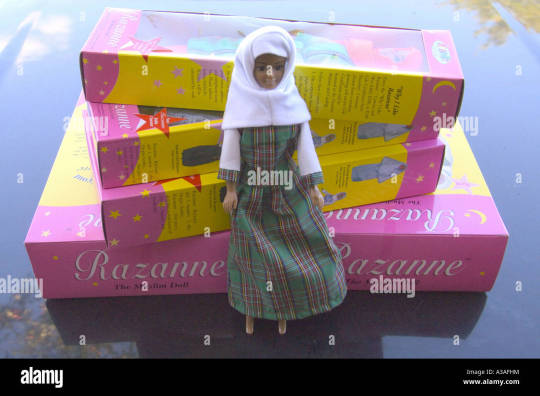
Meet Razanne! (And be prepared for a loooooong deep dive under the Keep Reading lol)
From what I've been able to piece together from various sources, she was created by Palestinian-American Ammar Saadeh and his wife Noor in 1996, being initially launched through the internet before more publicly advertised to Middle-Eastern and American audiences in 2004. Their goal was to show Muslim girls that "what matters is what's inside you, not how you look" (quoted from an interview with Greensoboro News and Record). They wanted to give them a role model with an emphasis on education and religion, while also having a career! To reflect the diversity of the global Muslim ummah, each of her dolls came in three variants: Pakistani-Indian (olive skin w/ dark hair), Black (dark skin w/ dark hair), and Caucasian (fair skin w/ fair hair).
While unfortunately she's no longer in production, the WayBack machine has a record of all her dolls released through the Noorart website! Each doll listing also includes additional information to educate on Islamic culture!
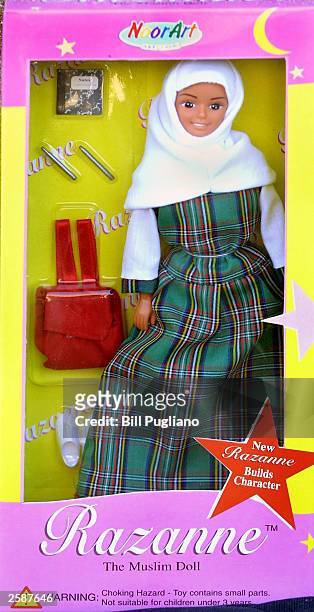
First there's Schoolgirl Razanne, whose listing reads:
"Razanne loves school and is all ready with her bright red book bag to join her friends in class. For your information…Traditional uniforms are worn by schoolgirls in Islamic schools. In addition to the usual subjects, students also study the Arabic language and the Qur'an - the Muslim Holy Book."
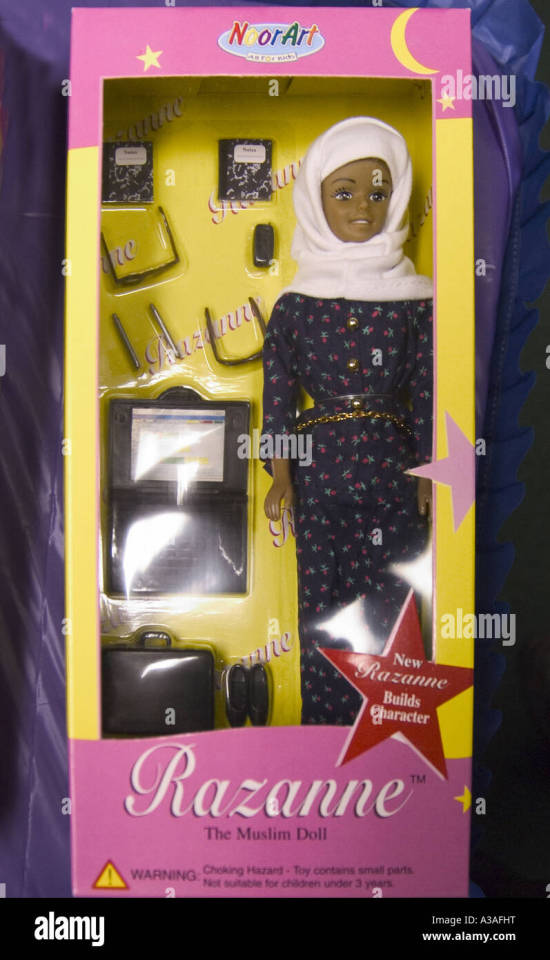
Next we have Teacher Razanne, whose listing reads:
"What is a more honorable and specialized career than education? Our teacher Razanne comes full equipped with lap top computer, briefcase and all the necessary items for school. For your information... Many Muslim girls study to become educators. Two-piece suits with jacket and skirt are popular styles for Muslim women who work outside the home as teachers or other professionals."
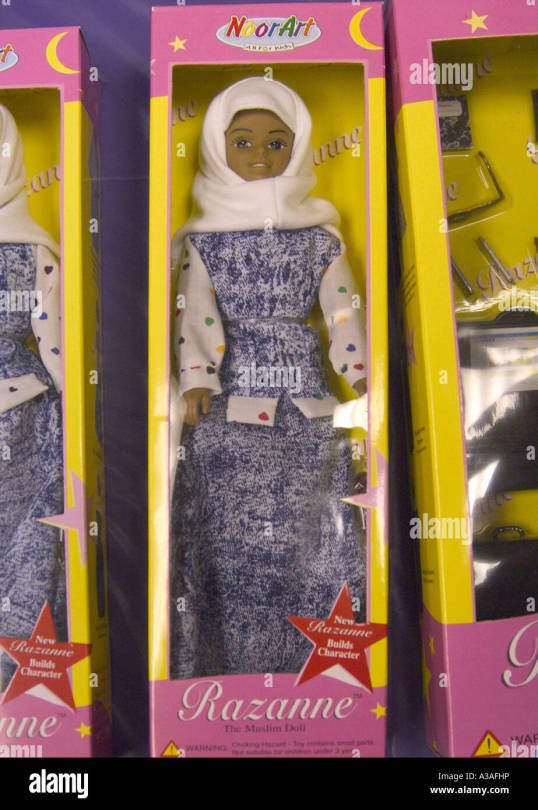
There's Playday Razanne, who unlike the prior two came with no accessories, her listing reads:
"Dressing modestly doesn't keep Razanne from having fun! On the playground, Razanne plays in her scarf and a loose fitting jumper that gives her lots of room to run and jump. For your information... Dressing modestly doesn't prevent Muslim girls from having fun outdoors! Whether biking, skating, on the playground or at the park children manage to have fun no matter where they are!"

We also have a Muslim Scout Razanne, who came with a free audiotape of Muslim Scout Cheers and a preview of We Love Muhammad! Her listing reads:
"'I'm honest, kind and trustworthy.' Muslim Scouts' organizations all over the world help build character and skills for success in this life and the next. Razanne wears her merit badges and awards earned for community service, Islamic behavior and Qur'an memorization. Respect for Allah, parents and all members of the community are a top priority with Razanne. For your information…like all Scout troops, Muslim Scouts are encouraged to excel in personal attributes such as honesty, cooperation and leadership as well as taking an active part in community service and environmental protection."
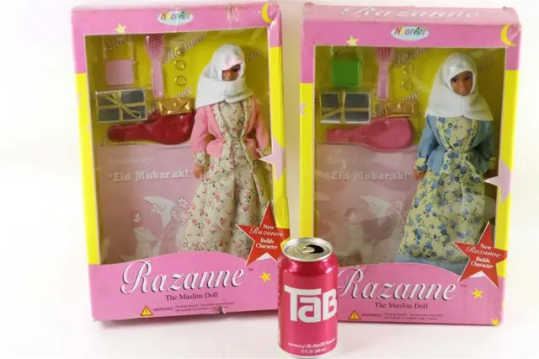
Next up there's Eid Mubarak Razanne, which came two different color variants for her outfit, her listing reading:
"Razanne is all ready to celebrate the Muslim holiday. Dressed in her new floral fashions of pink or blue, Razanne has Eid cards addressed to all her friends and is ready to deocorate the party with balloons. The perfect Eid gift for any girl! For your information… Muslims celebrate two major festivals each year. One is the Eid Al Fitr following the month-long fast of Ramadan. A second holiday occurs during the annual Pilgrimage to Makkah. Children and adults look forward to these two special days with great anticipation. Before the Eid the entire family goes out shopping for new clothes to wear for Eid Day. Early Eid morning the family meets with other members of the community for an Eid Prayer then disperse to family gatherings and other celebrations. Children are often given gifts of toys or money and families exchange delectable sweets that differ according to the region in which they live. Muslims exchange greetings of Eid Mubarak,"Eid Congratulations", Eid Saeed, "Happy Eid" and wish each other a coming year full of God's blessings. Kul 'am wa anta bi khair!"
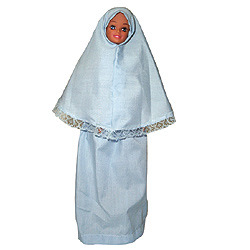
I wasn't able to find any other images for Prayer Razanne like the others unfortunately, and apparently she came with accessories too! Her listing reads:
"Allahu Akbar! God is the Greatest! It's time to pray and Razanne is ready! When it's time for prayer, many Muslim girls cover their everyday clothes with these traditional two-piece garments and stand to pray on colorful prayer rugs. We receive so many letters from customers that tell us that Razanne usually joins the family for salah! For your information… when it's time for prayer, many Muslim girls cover their everyday clothes with these traditional two-piece garments and stand to pray on colorful prayer rugs. Muslim women may pray in congregation at the Mosque but it is often more convenient to pray the five daily prayers at home."
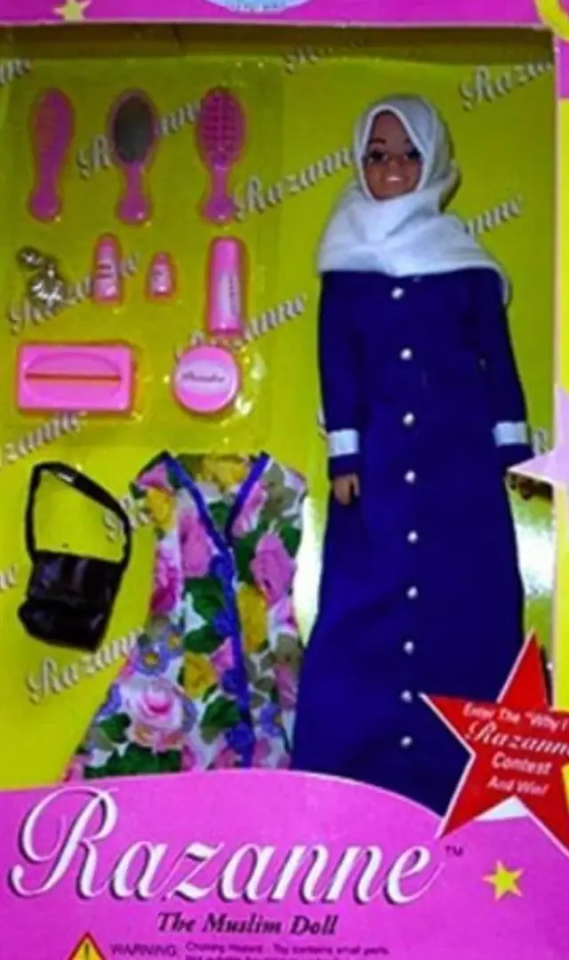
And finally we have In And Out Razanne, whose listing reads:
"In and Out Razanne comes with a two-piece fashion set for wear inside and outside the home. At home Razanne loves to dress in all the latest fashions. In a minute she can be ready to go out with this traditional jilbaab coat. Razanne helps Muslim girls understand that in the home they can be the ultimate fashion statement yet still have attractive attire while dressing modestly outside the home. For your information…Razanne helps Muslim girls understand that in the home they can be the ultimate fashion statement yet still have attractive attire while dressing modestly outside the home."
I'm honestly so glad I found this, because doing research into this doll has been a blast! I love the vintage vibes of her outfits with the patterns and color choices, and it makes me really happy seeing this doll being used as an educational tool for Islamic culture and practices!
Thank you to limbedolls.blogspot.com, emel.com, Greensboro News and Record, and "Framing Muslims" by Peter Morey and Amina Yaqin for the information that went into this long-ass post!
Ramadan Kareem!
165 notes
·
View notes
Text
THE 3 LEVELS OF NAFS
Three adjectives have been used in the Nobel Quran to describe three different types of nafs.
1. The first is nafs-ul-ammarah.
إِنَّ النَّفْسَ لَأَمَّارَةٌ بِالسُّوءِ Indeed the nafs that overwhelmingly commands a person to do sin.[12:53]
So this refers to that nafs, that is ruling over the self. So this is the first type of nafs and the sign that a person has this type of nafs is that they sin willingly, blatantly, remorselessly, in any way that they ever want.
2. Second type of nafs is known as nafs-ul-lawwamah.
Lawwamah, lawwam, it’s the same type of word as ammar and Allah Almighty has mentioned this in Quran:
وَلَا أُقْسِمُ بِالنَّفْسِ اللَّوَّامَةِ [75:2]
Lawwam here means to self incriminate, to self reproach, to have blame, to do mulamat of oneself. So, this is that nafs that does sometimes bring a person to do sin, but then that nafs self incriminates itself, it reproaches itself, it feels bad, it feels guilty. And then this guilt is supposed to increase so much so then the person leaves those sins because they feel so guilty about them.
3. The third way this word has been used in the Quran-e-Kareem is nafs-ul-mutmainnah.
يَا أَيَّتُهَا النَّفْسُ الْمُطْمَئِنَّةُ ارْجِعِي إِلَى رَبِّكِ رَاضِيَةً مَرْضِيَّةً To the righteous it will be said “oh reassured soul, return to your Lord well pleased, and pleasing to Him”
[89:27-28]
So, Allah Almighty addresses the mutma’in nafs. And mutma’in here means two things.
a) Number one is that they are mutma’in, they are content with the hukm of Allah Almighty, there is nothing else that makes them happy. b) Second meaning of mutma’in is that has reached a state of serenity. The serene, contented, tranquility, at peace nafs. And obviously, the peace here means that it has aman, itminan from doing sin and also aman and itminan from desiring sin. It has no unlawful desires.
, , ,
#allah#islam#muslim#prayer#jannah#salah#makkah#medina#kaaba#muslimah#hijab#quotes#instaislam#reminder#islamicquotes#islamicreminder#islamicpost#islamic#allahuakbar#alhamdulillah#photography#instagram#photooftheday#photo#instadaily#instagood#picoftheday#quran#hadiths
@wordofprophet for daily islamicreminders
22 notes
·
View notes
Text
First ever Recording of Quran in Makkah 1885
#islamdaily#allahswt#allah#welcome to islam#holy quran#islam#quran kareem#islamic#quran#allahuakbar#shifa ameen#quran recitation#quranic#quraan#quran ayah#surahs#muslim#muslim ummah#islamiyet#islamicreminders
27 notes
·
View notes
Note
Can you give advice to married couples who are having trouble conceiving children?
The first understanding to have is that through struggle comes the reward from Allah, The Exalted, and expiation for sins. The struggle itself then becomes a blessing from Allah, although we may not be aware of this and it may be difficult for us to comprehend. The second understanding is that Allah has a plan and a reason for all things. One example is that of Aaishah, may Allah be pleased with her, the wife of the Prophet sallallaahu alayhi wa sallam ( may Allah exalt his mention ).Aa`ishah was young, but she did not have children.
Hopefulness and Reliance upon Allah: It is important to never despair of the Mercy of Allah and to always remain hopeful that Allah will change the situation. Making Du`aa` (supplication) is essential in relation to this. There are several stories in the Quran that present beautiful lessons for mankind. The first is about Ibraaheem and his wife Saarah, may Allah exalt their mention: "And his wife was standing (there) and she laughed: But we gave her glad tidings of Isaac and after him, of Jacob. She said "Alas for me! Shall I bear a child, seeing I am an old woman, and my husband here, is an old man? That indeed would be a wonderful thing!" They said: "Do you wonder at Allah's decree? The grace of Allah and His blessings on you, O you people of the house! For He is indeed worthy of all praise, full of Glory!" [Quran 11:71-73]
There are several lessons to be learned from these stories, but the main one is that even in the seemingly most impossible circumstances, Allah may answer our prayers and bless us from his bounty.
You should always Make Dua and go for Umrah and pray in makkah that Allah will grant you from His grace and be patient.
23 notes
·
View notes
Text

Allah calls Himself As-Samad— The Eternal, Satisfier of Needs, the Refuge and Absolute— on one occasion in the Quran. As-Samad is the unchangeable one on whom the entire creation depends. He is the one unaffected by any circumstance and the only one able to fulfil all needs in the most perfect way, without Himself being in need of anything or anyone!
The Eternal, Everlasting Refuge, Satisfier of All Needs
Samad comes from the root saad-meem-daal, which points to two main meanings. The first main meaning is to reach or attain, or to aim toward something. The second main meaning is to turn to and to need, and the third is to remain unchanged and unaffected. The fourth main meaning is to be everlasting and eternal.
This root appears just once in the Quran, as the noun samad. The example is al-samadu (“The Eternal, Absolute”).
Linguistically, samad means something that is not affected by circumstances or something that is solid. Sumood refers to the concept of being firm and steadfast.
As-Samad is the the One who is not changed nor affected by anything in the creation, He is the eternal and absolute refuge to seek and depend on for all needs and desires.
As-Samad Himself says: Say, ‘He is Allah , [who is] One, Allah , the Eternal Refuge. He neither begets nor is born, nor is there to Him any equivalent.’ [Quran, 112:1-4]
A description of Allah
The only place in the Quran Allah ‘azza wa jall calls Himself As-Samad is in Surah Al-Ikhlaas; the virtuous surah mentioned in the authentic hadith in Muslim to equal one-third of the Quran. This short, but amazingly beautiful and profound surah is a description of Allah Himself, His Oneness, His samad’yyah and His incomparability. Allah revealed this surah as a powerful answer to the people of Makkah who asked the Prophet salallahu ‘alayhi wa sallam to describe His Lord and His ‘lineage.’
What is ikhlaas (sincerity)? It is doing deeds purely for Him and to seek His pleasure, because He is Al-Ahad, the One and Unique. It is turning to Him for our needs and desires and desire Him only, because He is As-Samad, The Eternal and Satisfier of Needs, and it is to live by the fact that there is no one equal to Him in any of His attributes!
How can you live by this name?
1. Recite and live by Surah al-Ikhlaas.
Recite Surah Al-Ikhlaas often to gain reward, but not only that; learn to understand each word and live by the names of Allah mentioned in it. Love to recite this surah and talk about it to others as you are describing your Lord. Learn how to correctly recite it and convey it to at least one other person and teach your children the history and/or tafseer (explanation) of this virtuoussurah in which As-Samad is mentioned in order to instil love of Allah in their hearts.
2. Realize your dependence on Him.
One of the meanings of As-Samad is the One who is independent and self-sufficient. If you look at a manager, for example, one who has a high position with authority over others, it still takes one note from his superiors to end his career. This person is not samad. Then look at what we need tu survive as human beings; air, water, food, and even love. Why do we often act like as if we are independent? Especially during good times when we are healthy and wealthy we tend to forget we are even dependant on As-Samad for the strap of our shoe. So remind yourself daily that you are dependent on Him.
3. Call upon Him.
Here’s a beautiful supplication the Prophet salallahu ‘alayhi wa sallam used to make as part of the morning:
“يَا حَيُّ يَا قَيُّومُ بِرَحْمَتِكَ أَسْتَغِيثُ أَصْلِحْ لِي شَأْنِي كُلَّهُ وَلَا تَكِلْنِي إِلَى نَفْسِي طَرْفَةَ عَيْنٍ”.
O Ever Living One, O Eternal One, by Your mercy I call on You to set right all my affairs. Do not place me in charge of my soul even for the blinking of an eye (i.e. a moment). [Al-Haakim, saheeh] Memorize this dua’ and say it with true desire, fully realizing your dependence on As-Samad!
4. Desire As-Samad.
Turn to As-Samad in good and bad times and rely on Him, resting assured He is the Eternal Refuge and the One who will satisfy your needs in the way He knows is best for you. If you truly believe in As-Samad, your strongest desire will be to meet Him and your only fear will be that of His displeasure. So strive to be a real servant of Allah. The disbeliever is a slave of his desires, or of fashion, his belly, and his money. So beg Him to decrease the love for this world in your heart, including love of being praised by people, and replace it with a firm desire for His pleasure alone.
Wallahu ta’alaa ‘alem
O Allah, As-Samad, we know that You are the only Eternal Refuge. Make us realize we need you at all times and aid us to be of those who turn to You only for our needs. Adorn us with a strong desire to please You alone, ameen!
#allah#islam#revert help team#asma al husna#muslim#revert help#ayat#dua#allah’s name#daily#pray#prayer#salah#god#hijab#muslimah#revert#revert islam#how to convert to islam#convert islam#new convert#convert#help#convert help#islam help#welcome to islam#how to convert islam#new revert
10 notes
·
View notes
Text
Unveiling the Real Story: How Key Figures Played a Role in the Early Betrayal of Islam
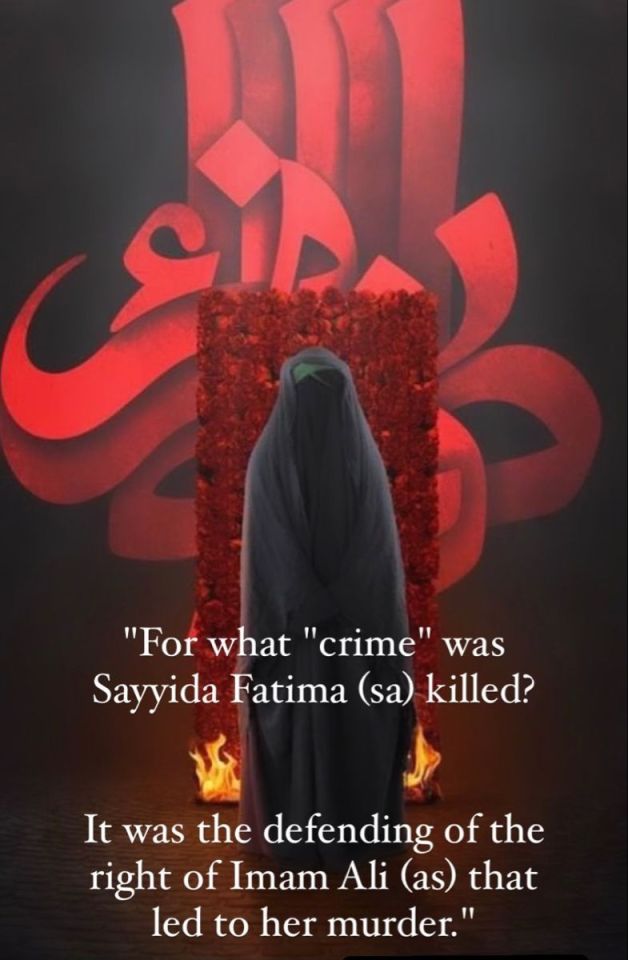
The story of Islam’s birth is woven with extraordinary sacrifices, fierce opposition, and, ultimately, a complex legacy that many believe has been obscured by history. While the Prophet Muhammad (SAWW) and his close family, the Ahl al-Bayt, faced relentless hardship, the behavior of some early converts raises profound questions about loyalty and intentions. In particular, we see a sharp divide between the sacrifices of the Prophet’s family, including Lady Khadija (SA) and Imam Ali (AS), and the contrasting path taken by future leaders who would shape Islam’s political landscape.
Early Opposition to Islam and the Prophet’s Nearest Supporters
As the Prophet Muhammad (SAWW) began spreading his message, he encountered fierce resistance from the Quraysh, who controlled Makkah’s political and economic spheres. Only a few supporters stood by him unwaveringly, most notably his wife, Lady Khadija (SA), and his young cousin, Imam Ali (AS). These figures were not only the first to believe in his message but also the first to sacrifice everything they had to see it succeed. In contrast, key figures like Abu Bakr, Umar, and Uthman, while outwardly accepting Islam, seem to have faced far less opposition, enjoying protection from influential families even as true believers suffered persecution and death.
Lady Khadija: The True Mohsin of Islam
Lady Khadija’s immediate acceptance of Islam upon the Prophet’s revelation set the standard for devotion. Her role extended far beyond emotional support; she provided her entire fortune to shield the Prophet from his enemies and facilitate the spread of his message. Her wealth became a shield for the early Muslim community, funding campaigns, sheltering followers, and even buying the Prophet (SAWW) and his supporters much-needed peace amid hostile conditions.
During the intense Quraysh-imposed boycott on Banu Hashim, Khadija’s last resources were spent ensuring the community could survive in the barren valley of Shab e Abu Talib. She endured starvation, thirst, and deprivation, ultimately sacrificing her own life. This selflessness has earned her the title of “Mohsin of Islam” – the true benefactor whose generosity and faith provided Islam with the foundation it needed to endure.
In stark contrast, many of the prominent early converts, including the first three caliphs, seemed to experience a level of immunity from the Quraysh’s wrath. Figures such as Abu Bakr, Umar, and Uthman are notably absent from records of persecution and torture. Their alliances with Qurayshi families allowed them to convert without fear, raising questions about their motivations and long-term intentions.
The Persecution of True Believers Outside Banu Hashim
The divide between true believers and those protected by political affiliations is made starkly clear through the persecution of early Muslims like Ammar bin Yasir, whose parents were killed for their faith. His mother, Sumayyah, and father, Yasir, suffered brutal deaths, serving as powerful examples of the sacrifices endured by the Prophet’s early followers. The torture and killing of Banu Hashim supporters, along with the exiling of others to Abyssinia, stand in contrast to the privileged positions of certain early converts, whose families protected them from harm.
Prophet Muhammad (SAWW) received little support outside his family and close followers. The strength of Islam’s early community lay primarily within Banu Hashim, bolstered by a handful of individuals who accepted suffering in order to preserve the message. Lady Khadija’s support and Imam Ali’s courage in defending the Prophet under life-threatening conditions reflect an unwavering loyalty unmatched by those who were later poised to assume leadership of the Muslim community.
Political Calculations and Strategic Marriages: The Long-Term Ambitions of the First Caliphs
As Islam gained influence, these individuals, particularly Abu Bakr and Umar, positioned themselves strategically. Through marriage alliances with the Prophet, they sought both legitimacy and a lasting foothold in the growing Muslim community. The marriages of their daughters to the Prophet seem not to have been acts of devotion but rather calculated steps, part of a broader ambition to gain influence within the new Islamic order. These connections afforded them both prestige and an implicit claim to power—a plan that would reveal itself fully only after the Prophet’s passing.
The Prophet’s Passing and the Power Struggle that Followed
After the Prophet’s death, the struggle for leadership culminated in a sudden shift away from the Ahl al-Bayt, despite the Prophet’s repeated declarations of Imam Ali (AS) as his chosen successor. The Prophet’s family, already reeling from his loss, now faced betrayal from those who had once stood by them, or so it seemed. Abu Bakr’s swift assumption of leadership, followed by Umar and Uthman, effectively sidelined Imam Ali (AS) and the Prophet’s family from the authority that had been rightfully theirs.
This power struggle took a devastating toll on the Ahl al-Bayt, culminating in the death of Lady Fatima (SA) under suspicious circumstances. Her pleas for justice went unheard, her rights denied, and her final days marked by grief and pain inflicted by those who had once pledged loyalty to her father.
The Lasting Legacy of Lady Khadija’s Sacrifice
In comparison, Lady Khadija’s legacy shines as a beacon of true sacrifice and faith. Her contributions, both material and emotional, became the bedrock of early Islam. The lasting gratitude the Prophet felt for her was evident throughout his life; he would often remember her kindness, calling her the “best of women.” Lady Khadija’s sacrifices, alongside those of the Prophet’s family, continue to stand in contrast to the privileged lives of others who would later wield power in the Muslim community.
Her example reveals a clear divide in motives: while some were willing to give everything for Islam, others capitalized on its rise without enduring its hardships. Lady Khadija’s story serves as a powerful reminder that the truest believers are those who sacrifice without expectation, embodying the values of justice, mercy, and selflessness that the Prophet Muhammad (SAWW) cherished.
Conclusion: A Legacy of Betrayal and the Courage of the Ahl al-Bayt
The sacrifices of Lady Khadija, Imam Ali, and Lady Fatima underscore a dedication to Islam that transcends political gain—a dedication grounded in love, loyalty, and faith. These were the qualities that sustained Islam in its infancy, making their betrayal by certain early figures all the more painful. Despite the best efforts to erase these truths from history, the actions and words of the Ahl al-Bayt continue to testify to their rightful place and their sacrifices for Islam. As readers, we are left to question: if the true believers sacrificed everything, what was it that others were protecting?
#LadyKhadija#MohsinOfIslam#IslamicHistory#ProphetMuhammad#Sacrifice#EarlyMuslims#ShiaIslam#DivineProtection#SupportOfTheProphet#Khadija#IslamicHeroines#HistoryOfIslam#AhlulBayt#TruthAndSacrifice#imam ali#literature#maula ali#shia#shia islam#ya ali maddad#artists on tumblr#pandora's vault#pandora's box#pandora#SacredGrief#IslamicElegy#LightOfIslam#ShiaTradition#InjusticeInHistory#TruthOfFatimiyya
26 notes
·
View notes
Text
Your Islam is so much more than just aesthetics. Putting niqabi doodles on your profiles...or using pictures from Makkah as your wallpapers...or posting quotes about halal love and nikah. Your Islam is so much more than what you put on your status updates. So much more than the quotes, ayat and ahadith you paste without thinking that you could memorize it first. So much more than what you share in your Instagram stories. So much more than what the virtual world can perceive.
Let not the shaytan deceive you and limit your Islam to a digital version only. Turn off your screen and put back your cameras. Close the door for a while where all you can hear are notifications from the apps where you appear a pious muslim.
Listen to the silence in your solitude...what does it say?
#reminder to me first#muslim tumblr#aesthetics#sheherrzaad#mashriqiyyah#mine#things are getting really scary though 💔#islam
36 notes
·
View notes
Text
Tafsir Ibn Kathir: Surah Al-Kahf
In the Name of Allah, the Most Gracious, the Most Merciful.
Revealed in Makkah
Imam Ahmad recorded that Al-Bara' said:
"A man recited Al-Kahf and there was an animal in the house which began acting in a nervous manner. He looked, and saw a fog or cloud overhead. He mentioned this to the Prophet, who said:
Keep on reciting so and so, for this is the tranquility which descends when one reads Qur'an or because of reading Qur'an;
This was also recorded in the Two Sahihs.
This man who recited it was Usayd bin Al-Hudayr, as we have previously mentioned in our Tafsir of Surah Al- Baqarah.
What has been mentioned about the Virtues of this Surah and the first and last ten Ayat, which provide protection from the Dajjal
Imam Ahmad recorded from Abu Ad-Darda' that the Prophet said:
Whoever memorizes ten Ayat from the beginning of Surah Al-Kahf will be protected from the Dajjal.
This was also recorded by Muslim, Abu Dawud, An-Nasa'i and At-Tirmidhi.
According to the version recorded by At-Tirmidhi,
Whoever memorizes three Ayat from the beginning of Al-Kahf.
He said, it is "Hasan Sahih.''
In his Mustadrak, Al-Hakim recorded from Abu Sa`id that the
Prophet said:
Whoever recites Surah Al-Kahf on Friday, it will illuminate him with light from one Friday to the next.
Then he said:
"This Hadith has a Sahih chain, but they (Al-Bukhari and Muslim) did not record it.''
Al-Hafiz Abu Bakr Al-Bayhaqi also recorded it in his Sunan from Al-Hakim, then he narrated with his own chain that the Prophet said:
Whoever recites Surah Al-Kahf as it was revealed, it will be a light for him on the Day of Resurrection.
13 notes
·
View notes
Text
The Life of The Prophet Muhammad(pbuh): Farewell Hajj and the Death of the Prophet (pbuh)
Farewell Hajj
(10th Year of the Migration, the month of Dhul-Hijjah / AD 632, March)
It was the 10th year of the Migration, the month of Dhul-Qada.
The Messenger of God made preparations for hajj. He also ordered the Muslims in Madinah to make preparations for hajj. In addition, he sent Madinah.
Upon this news, thousands of Muslims who wanted go to hajj started to flood into Madinah. Soon, Madinah was full of the light of Islam and luminous faces. Tents were set up around Madinah.
Muslims were experiencing a unique atmosphere of a festival and the Messenger of God was praising and thanking God Almighty in the peace and happiness of seeing the magnificent result of the great cause that he conveyed to people.
Leaving Madinah
There were five days left for the end of the month of Dhul-Qada. It was Saturday.
The Messenger of God appointed Abu Dujana as-Saidi as his deputy in Madinah. He had a bath in his house. He wore some nice perfume and put on new clothes. He left his house toward noon and went to the mosque. He led the noon prayer.
The Prophet set off from Madinah with more than one hundred thousand Muslims who surrounded him like luminous circles and reached Dhul-Hulayfa. He spent the night there with his great congregation.
The next day, he performed the noon prayer and entered ihram there. Then, he headed toward Makkah with his Companions, each of whom is a star of the humanity.
The Messenger of God was on his camel, Qasva. More than one hundred thousand Companions were like planets that did not lose their orbits around the spiritual sun. They uttered talbiyah: “Labbayk! “Labbayk! Allahumma labbayk! Labbayka la sharika laka Llabbayk! Innal hamda wan’nimata laka wa’l-mulka la sharika laka.” (Here I am, O God, here I am. Here I am, You have no partner, here I am. Verily all praise and blessings are Yours, and all sovereignty, You have no partner.)
It was as if the earth was like a single mouth and repeating the same “talbiyah” with hundreds of thousands of tongues. The earth and the sky were virtually sharing the joy and the excitement of the Messenger of God and his Companions.
Arriving in Makkah
It was Monday, the fourth of the month of Dhul-Hijjah, early in the morning.
The Messenger of God entered Makkah from the upper part of the city called Thaniyyatu’u-Kada with more than one hundred thousand Muslims. When he saw the magnificent Kaaba, the Prophet prayed as follows: “O my Lord! Increase the magnificence, honor and grandeur of this magnificent Kaaba.
Then, the Prophet reached Baytullah. He made istilam toHajaru’l-Aswad and started to circumambulate the Kaaba from that corner. During the first three laps of the circumambulation, he took short steps and jerked his shoulders, walking fast and pompously; he walked slowly during the remaining four laps of the circumambulation.
After completing the circumambulation by walking around the Kaaba seven times, he went to the Station of Ibrahim. He performed a prayer of two rak’ahs there. Then, he made istilam to Hajaru’l-Aswad again. Meanwhile, he said to Hazrat Umar, “O Umar! You are strong. Do not shoulder others in order to touch Hajaru’l-Aswad. Do not disturb people especially weak ones. If there are not many people around, touch it. If it is very crowded, greet and kiss it from a distance with your hands; utter, ‘La ilaha illalah and Allahu akbar’.”
The Prophet Performs Sa’y
The Messenger of God went up to Safa Hill after that. He praised and thanked God Almighty there. Then, he came down and performed sa’y between Safa and Marwa seven times.
Going to Mina
After staying in Makkah on Sunday, Monday, Tuesday and Wednesday, the Messenger of God went to Mina on Thursday. He performed the noon, afternoon, evening and night prayers there in congregation. He spent the night there. On Friday, the ninth of Dhul-Hijjah, he set off from Minah after performing the morning prayer and headed toward Arafat.
The earth and the sky were resounding with the talbiyahs uttered by the Companions.
#allah#muslim#convert#revert islam#revert help#converthelp#muslimah#reverthelp#hijab#new muslim#new convert#how to convert to islam#convert to islam#welcome to islam#god#islam#quran#revert#convert islam#revert help team#help#islamhelp#prayer#salah#reminder#pray#dua#muhammed#new revert
7 notes
·
View notes
Text
dhul hijjah 2025 - a second chance after ramadan ♡


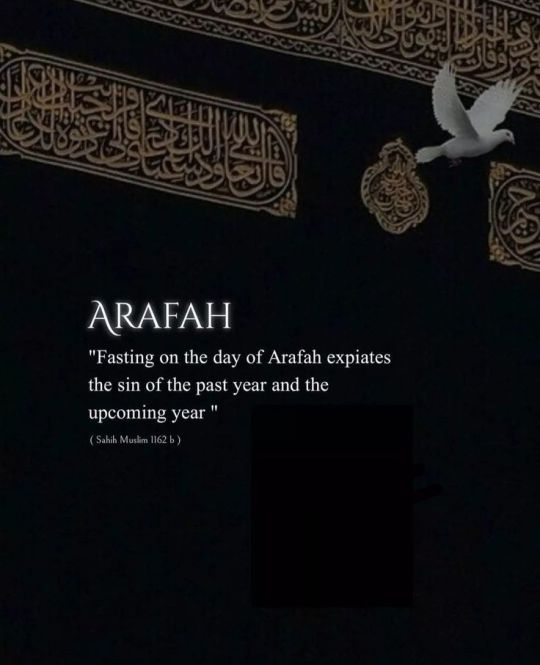
what is dhul hijjah?
meaning 'the month of the pilgrimage' as many muslims go on hajj in this time, dhul hijjah is the twelfth and final month of the islamic year. the first ten days of this month are the best days of the entire year. yes - even better than ramadan:
it was narrated by Ibn Abbas that the Prophet ﷺ said: “There are no days during which righteous deeds are more beloved to Allah than these days,” meaning the (first) ten days of Dhul-Hijjah" - Sunan Ibn Majah 1727
these ten days encompass the day of Arafah, Hajj, and Eid ul-Adha
this month, we remember prophet Ibrahim (as) and how he was told by Allah to sacrifice his son, Hadrat Ismail (as). he took hadrat Ismail (as) on top of mount Arafat for the sacrifice, and just as he was about to sacrifice Ismail (as), Allah told him to stop as He was only testing him to see if he was truly obedient and willing to sacrifice everything for Allah's sake. the 9th day of dhul hijjah is the day of Arafah, commemorating this event.
we also remember how Allah told Ibrahim (as) to leave Ismail (as) and his wife, Hadrat Hajar, in a desert - which, today, is present day makkah.
this month is therefore about obedience, surrender and sacrifice for Allah سُبْحَٰنَهُۥ وَتَعَٰلَىٰ.
depending on the sighting of the moon, dhul hijjah is expected to begin 28th may!
what to do in these first ten days?
even if you're not going for hajj, you should use these blessed days for extra righteous deeds and worship, especially on the day of arafah - the 9th day (which falls on 5th june this year, Insha'Allah) - the day before eid.
FASTING
it is a sunnah to fast the first 9 days of dhul hijjah. if you won't fast all 9 days, then it's best to prioritise the 9th day, the day of Arafah. this is because the prophet ﷺ said: “Fasting on the Day of ‘Arafah expiates for the sins of the year before and the year after.” (Sunan Ibn Majah 1730) however, unless you're going for hajj and you're actually at Afarah, then you cannot as it's forbidden to fast while on the mountain.
if you can't or are unable to fast, you can give an expiation (fidya).
DHIKR
it's extremely important to increase your dhikr in this time. recite the tasbeeh, tahmeed, takbeer and tahleel often: tasbeeh - subhanallah (Holy is Allah) tahmeed - alhamdulillah (all praise belongs to Allah) takbeer - Allah Akbar (Allah is the Greatest) tahleel - laa ilaha ill-Allah (there is no God except Allah) Allah said “remembrance of Allah indeed is the greatest virtue” (29:46) - it brings you closer to Him, you feel more certain in His powers that He can remove any hardship which makes the heart feel less anxious, Allah becomes your Friend, you'll become successful (remember Allah often so you may prosper” (8:46), it cleans your heart, it protects you from harm, Allah becomes pleased with you. it truly is the greatest virtue.
also recite istighfar (astagfirullah) and repent for your sins
the best dua to recite on the day of Arafah itself is:
laa ilaaha ill-allaahu, waḥdahu laa shareeka lah, lahul-mulku wa lahul-ḥamdu, wa huwa ‛alaa kulli shay’in qadeer - (None has the right to be worshipped except Allah, alone, without partner. To Him belongs sovereignty and all praise and He is over all things omnipotent)
OTHER INCREASED ACTS OF WORSHIP
do extra voluntary acts of worship (nawafil, sunnah prayers, duha prayers)
read a lot of Qur'an
listen to the Qur'an more
send many, many salutations to the Prophet ﷺ (durood sharif!)
practice gratitude. what are you thankful for?
pray tahajjud
give sadaqah / donate to a charity. make sacrifices!
be kind!
read translation and commentary of surahs
listen to islamic podcasts/read islamic books to increase your knowledge
memorise a surah
talk to Allah!!!! pray!!!!
try and increase your acts of worship throughout the 9 days and especially on the 9th day, the day of arafah, which is the day before eid! (16th june Insha'Allah, depending on where you are in the world)
10th day - eid ul adha
on the tenth day of dhul hijjah (eid), our beloved Prophet ﷺ used to give Qurbani (a sacrifice) every year to remember Ibrahim (as) almost sacrificing his son for Allah سُبْحَٰنَهُۥ وَتَعَٰلَىٰ's sake. muslims sacrifice animals all over the world to follow this sunnah, and donating qurbani is encouraged for every Muslim who is financially able to do so (this can be done online)

may Allah سُبْحَٰنَهُۥ وَتَعَٰلَىٰ make it easy for us to utilise these blessed and best 10 days to the best of our abilities, forgive us of our sins, draw us ever nearer to Him and allow us to become His best friends, Allahumma Ameen ♡
#had to re-make this post with updated dates for this year lol#islam#dhul hijjah#muslim#quran#allah#sabrgirl
25 notes
·
View notes
Text

Beneath the Veil by Zingaia
“At the center of Islam abides the Divine Feminine. The world famous Sufî poet Mevlana Jalaluddin Rumi (1207 – 1273) writes: “Woman is the radiance of God; she is not your beloved. She is the Creator —you could say that she is not created.”
Sufîsm cherishes the esoteric secret of woman, even though Sufîsm is also the esoteric aspect of a seemingly patriarchal religion. Muslims (someone who surrender to God) pray five times a day facing the city of Makkah. Inside every mosque is a niche, or recess, called the mihrab – a vertical rectangle curved at the top that points toward the direction of Makkah. The Sufîs know the mihrab to be a visual symbol of an abstract concept: the transcendent vagina of the female aspect of divinity. In Sufîsm, woman is the ultimate secret, for woman is the soul. Toshihiko Izutsu writes, “The wife of Adam was feminine, but the first soul from which Adam was born was also feminine.”
The Divine Feminine has always been present in Islam. This may be surprising to many people who wrongly perceived Islam as a patriarchal religion. Maybe the reason for this misconception is the very nature of the feminine in Islam. The Divine Feminine in Islam manifests metaphysically and in the inner expression of the religion. The Divine Feminine is not so much a secret within Islam as she is the compassionate heart of Islam that enables us to know divinity. Her centrality demonstrates her necessary and life-giving role in Islam.
Sufîsm has always honored the Divine Feminine. Of course, Allâh (God) has both masculine and feminine qualities, but to the Sufî, Allâh has always been the Beloved and the Sûfî has always been the Lover. The Qur’an, referring to the final Day, perhaps divulges a portion of this teaching: “And there is manifest to them of God what they had not expected to see.”
There was a question long debated in Islam: can we see Allâh? The Prophet said in a hadith (narrations of the Prophet), “In Paradise the faithful will see Allâh with the clarity with which you see the moon on the fourteenth night (the full moon).” Theologians debated what this could mean, but the Sufîs have held that you can see Allâh even in this world, through the “eye of the heart.” The famous Sufî martyr al-Hallaj said in a poem, “I saw my Lord with the eye of my heart”. Relevant to the focus of this paper is that Sufîs have always described this theophanic experience as the vision of a woman, the female figure as the object of ru’yah (vision of Allâh).
There was a great Sufî Saint who was born in 1165 C.E. Besides Shi’a Muslims, numberless Sunni scholars called him “The Greatest Sheikh” (al-Shaykh al-Akbar). His name was Muyiddin ibn al-‘Arabî. He said, “To know woman is to know oneself,” and “Whoso knoweth his self, knoweth his Lord.” Ibn al-’Arabî wrote a collection of poems entitled “The Tarjumân al-ashwâq”. These are love poems that he composed after meeting the learned and beautiful Persian woman Nizam in Makkah. The poems are filled with images pointing to the Divine Feminine. His book Fusûs al-hikam, in the last chapter, relates that man’s supreme witnessing of Allâh is in the form of the woman during the act of sexual union. He writes, “The contemplation of Allâh in woman is the highest form of contemplation possible: As the Divine Reality is inaccessible in respect of the Essence, and there is contemplation only in a substance, the contemplation of God in women is the most intense and the most perfect; and the union which is the most intense (in the sensible order, which serves as support for this contemplation) is the conjugal act.” Allâh as the Beloved in Sufî literature, the ma‘shûq, is always depicted with female iconography.”
~ Laurence Galian (Abdullah Muzaffer), The Centrality of The Divine Feminine In Sufism
#The Divine Feminine#Sufi Gnosis#The Centrality of The Divine Feminine In Sufism#Ibn Arabi#Laurence Galian (Abdullah Muzaffer)
4 notes
·
View notes
Text
🍃🕊🍃 The Birth Of Imam Ali (as)
Ali was born on the 13th of Rajab of the 30th year of the Elephant (A.D. 600). His cousin, Muhammad (S), was now 30 years old. Ali's (as) parents were Abu Talib ibn Abdul Muttalib, and Fatima, the daughter of Asad, both of the clan of Hashim. (pbbut)
Ali (as) was born inside the Kaaba in Makkah. The great historian, Masoodi, the Herodotus of the Arabs, writes on (page 76 of Volume II) of his book, Murooj-udh-Dhahab (The Golden Meadows), that one of the greatest distinctions that Ali (as) enjoyed was that he was born in the House of Allah. Some of the other authorities who have affirmed Ali's (as) birth in the Kaaba, are:
1. Muhammad ibn Talha el-Shafei in Matalib-us-saool,
(page 11)
2. Hakim in Mustadrak,
(page 483, Vol. III)
3. El-Umari in Sharh Ainia,
(page 15)
4. Halabi in Sira,
(page 165, Vol. I£
5. Sibt ibn al-Jauzi in
Tadhkera Khawasil Ummah,
(page 7)
6. Ibn Sabbagh Maleki in
Fusoolul Mohimma,
(page 14)
7. Muhammad bin Yousuf Shafei in Kifayet al-Talib,
(page 261)
8. Shablanji in
Nurul Absar,
(page 76)
9. Ibn Zahra in
Ghiyathul Ikhtisar,
(page 97)
10. Edvi in Nafhatul Qudsia,
(page 41)
Among the modern historians, Abbas Mahmood al-Akkad of Egypt writes in his book Al-'Abqarriyet al-Imam Ali, (Cairo, 1970), that Ali ibn Abi Talib (as) was born inside the Kaaba.
Another contemporary historian, Mahmood Saeed al-Tantawi, of the Supreme Council of Islamic Affairs, Arab Republic of Egypt, writes on (page 186) of his book, Min Fada-il al-‘Ashrat al-Mubashireen bil Janna, published in 1976 by Matab’a al-Ahram at-Tijariyya, Cairo, Egypt:
“May God have mercy upon Ali ibn Abi Talib (as)
He was born in the Kaaba.
He witnessed the rise of Islam;
He witnessed the Da’wa of Muhammad (S) and
He was a witness of the Wahi (Revelation of Al-Qur’an al-Majid).
He immediately accepted Islam even though he was still a child, and
He fought all his life so that the Word of Allah would be supreme.”
An Arab poet composed the following distich on the birth of Ali:
He (Ali) is the one for whom the House of Allah was turned into a maternity home; And he is the one who threw the idols out of that House; Ali (as) was the first and the last child ever to be born in the Kaaba.
It was a custom of the Arabs that when a child was born, he was placed at the feet of the tribal idol or idols, thus symbolically “dedicating” him to the pagan deity. All Arab children were “dedicated” to the idols except Ali ibn Abi Talib (as)
When other Arab children were born, some idolater came to greet them and to take them in his arms.
But when Ali (as) was born, Muhammad (S) the future Messenger of God (S) came into the precincts of the Kaaba to greet him.
He took the infant into his arms, and dedicated him to the service of Allah.
The future Prophet must have known that the infant in his arms was some day going to be the nemesis of all idolaters and polytheists and of their gods and goddesses.
When Ali (as) grew up, he extirpated idolatry and polytheism from Arabia with his sword.
Birth in Kaaba was one out of many distinctions that God bestowed upon Ali (as).
Another distinction that he enjoyed was that he never adored the idols. This again makes him unique since all Arabs worshipped idols for years and years before they abjured idolatry and accepted Islam.
It is for this reason that he is called “He whose face was honored by Allah.” His face was indeed honored by Allah as it was the only face that never bowed before any idol.
Ali (as) was the youngest child in the family. Of the three of his brothers, Talib and Aqeel, were many years older than him; Jaafer was ten years older (pbbut)
The birth of Ali (as) filled the heart of the future Apostle with boundless happiness.
The child was someone “special” for him. After all, Muhammad (S) had many other cousins and they had their own children, and Ali (as) himself had three elder brothers; but he didn't show any interest in any of them. Ali and Ali (as) alone was the focus of his interest and love.
When Ali (as) was five years old, Muhammad (S) adopted him, and from that moment they were never to part with each other.
There is a story that once there was a famine in Makkah, and the surrounding areas, and Abu Talib, being in dire straits at the time, was finding it difficult to support a large establishment. It occurred to Muhammad (S) that he ought to try to mitigate some of his uncle's burden of responsibilities, and was thus prompted to adopt Ali (as)
It is true that Muhammad (S) adopted Ali (as) but not for the reason stated above. In the first place, Abu Talib was not in such dire straits that he could not feed a child of five; he was a man of rank and substance, and his caravans plied between Hijaz and Syria or between Hijaz and Yemen. In the second place, feeding a child of five years would have hardly made any difference to a man who fed even strangers if they were hungry.
Muhammad and Khadija (pbbut) adopted Ali (as) after the death of their own sons. Ali (as) thus filled a void in their lives. But Muhammad (S) the future Prophet, also had another reason for adopting Ali (as). He picked out Ali (as) to bring him up, to educate him, and to groom him for the great destiny that awaited him in the times to come.
Dr. Taha Hussain of Egypt says that the Messenger of God himself became Ali's guide, teacher and instructor, and this is one more distinction that he enjoys, and which no one else shares with him (Ali).
About Islam it has been said that of all the universal religions, it is the only one which has grown in the full light of history, and there is no part of its story which is in obscurity.
🕋 Bernard Lewis 🕋
In an essay on Muhammad and the origin of Islam, Ernest Renan remarks that, unlike other religions which were cradled in mystery, Islam was born in the full light of history. “Its roots are at surface level, the life of its founder is as well known to us as those of the Reformers of the sixteenth century”. (The Arabs in History, 1960,)
🕋 G. E. Von Grunebaum 🕋
Islam presents the spectacle of the development of a world religion in the full light of history. (Islam, 1969)
Similarly, it may be said that of all the friends and companions of Muhammad (S) the Prophet of Islam, Ali (as) is the only one who grew up in the full light of history. There is no part of his life, whether it is his infancy, childhood, boyhood, youth, manhood, or maturity, that is hidden from the spotlight of history. He was the cynosure of all eyes from his birth to his death.
On the other hand, the rest of the companions of the Prophet come to the attention of the student of history only after they accept Islam, and little, if anything, is known about them until then.
Ali (as) was destined to become the right arm of Islam, and the shield and buckler of Muhammad (S), the Messenger of God. His destiny was inseparably linked with the destiny of Islam, and the life of its Prophet. He was present at every juncture in the history of the new movement, and he played the stellar role in it.
It was, incidentally, a role that he alone could have played. He reflected the “image” of Muhammad. The Book of God itself called him the “soul” or the alter ego (a second self) of Muhammad in (verse 61) of its
(third chapter), and paraded his illustrious name across the horizons of history.
In the years to come, the creative synergy of Muhammad (S) and Ali (as) – the master and the disciple – was going to place the “Kingdom of Heaven” on the map of the world.
🍃🕊🍃 al-Islam.org 🍃🕊🍃
.

6 notes
·
View notes
Text
BE THE FIRST IN YOUR FAMILY
To destroy the haram culture To destroy all the innovations To do a simple nikkah To encourage hijab and modesty To put and teach Islam first To start a chain of strong believers To build a home centered around the remembrance of Allah
. . .
#islamic#islam#allah#muslim#islamicquotes#quran#muslimah#allahuakbar#deen#dua#makkah#islamicpost#islamicreminders#sunnah#prophetmuhammad#nikkah#alhamdulillah#muhammad#islamicreminder#muslims#instagram#modesty#believers#madinah#hijab#islamicquote#explorepage#reelsinstagram#quotes#haram
11 notes
·
View notes